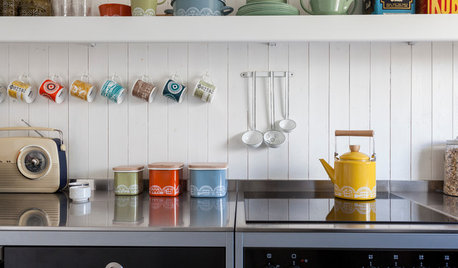coffee grounds
canyonsister
13 years ago
Related Stories

DECORATING GUIDESNo Neutral Ground? Why the Color Camps Are So Opinionated
Can't we all just get along when it comes to color versus neutrals?
Full Story
BASEMENTSBasement of the Week: Clever Details Update a Below-Ground Lounge
Lower-level design reaches new heights with rearranged ductwork, lighting, a new ceiling and modern styling
Full Story
CONTEMPORARY HOMESHouzz Tour: A Brave Addition Breaks New Ground
An Edwardian cottage gets a radical renovation with a dynamic deck that wraps a couple and 2 children in style
Full Story
KITCHEN DESIGNSimple Pleasures: Wake Up and Smell the Coffee
Slugging down any old sludge while pulling on socks is no way to start the day. Learn to brew amazing java and savor the experience here
Full Story
LIFEHow Do You Make Your Tea and Coffee in the Morning?
A morning cup is a must for many, and preparation comes in many guises. We look at coffee and tea habits across the Houzz community
Full Story
KITCHEN DESIGNWake Up Your Kitchen With a Deluxe Coffee Center
Get all the ingredients for the perfect morning jump-start with a station dedicated to your cup of joe
Full Story
KITCHEN DESIGNCoffee Bars Energize Any Room
Love coffee? Wake up to these great designs for a café-style area in the kitchen, guest room and even bathroom
Full Story
KITCHEN DESIGNHot Ideas and Tips for Coffee and Tea Stations
Let options like drawer inserts and built-in coffeemakers percolate now, so your hot-drinks station can best serve holiday guests
Full Story
FURNITUREHow to Pick Out a Coffee Table
Get a great fit for your room and your lifestyle by considering a coffee table’s size, features and aesthetics
Full Story








brdldystlu
lcpw_gw
Related Professionals
Deer Park Landscape Architects & Landscape Designers · Hyattsville Landscape Architects & Landscape Designers · Newcastle Landscape Architects & Landscape Designers · Sahuarita Landscape Architects & Landscape Designers · Camp Verde Landscape Contractors · Hannibal Landscape Contractors · Lewisville Landscape Contractors · New Braunfels Landscape Contractors · Ramsey Landscape Contractors · Southbury Landscape Contractors · North Hills Landscape Contractors · Shafter Landscape Contractors · Mebane Decks, Patios & Outdoor Enclosures · South Miami Heights Decks, Patios & Outdoor Enclosures · White Bear Lake Decks, Patios & Outdoor EnclosuresKimmsr
canyonsisterOriginal Author
robertz6
Lloyd
toxcrusadr
borderbarb
cheapheap
billums_ms_7b
Kimmsr
lisascenic Urban Gardener, Oakland CA